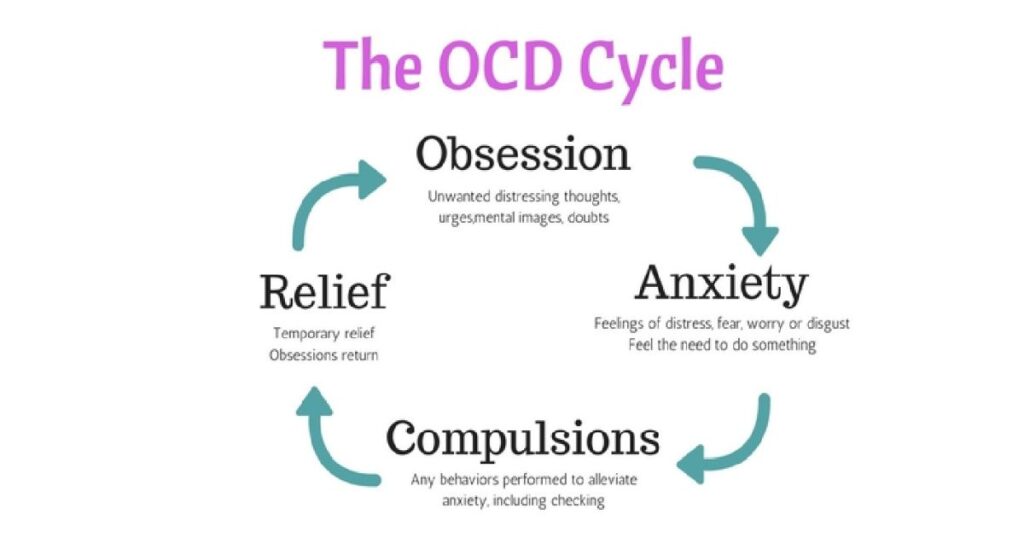What is OCD?
Obsessive-compulsive disorder (OCD) is a common mental health condition characterized by intrusive thoughts (obsessions) and repetitive behaviors or mental acts (compulsions). These obsessions can be unwanted, distressing, and persistent, causing anxiety and distress. Compulsions are performed in an attempt to neutralize the anxiety caused by the obsessions or prevent some feared outcome from happening.
Read More: Digital News Planet
While the specific content of obsessions and compulsions can vary widely, OCD rumination is a common and often overlooked feature.

Understanding the Link Between OCD Rumination and Intrusive Thoughts:
Intrusive thoughts can occur in anyone, regardless of whether they have OCD. However, the key difference lies in how these thoughts are responded to.
In OCD, rumination becomes a compulsion, a mental act used to attempt to manage the anxiety caused by intrusive thoughts. Instead of simply acknowledging the thoughts and letting them go, individuals with OCD engage in mental review, analysis, and attempts to neutralize the perceived threat. This cycle of rumination and anxiety can become a vicious loop, further reinforcing the OCD cycle.

Common Symptoms of OCD Rumination:
- Mental reviewing: Going over past events, conversations, or actions in detail, searching for any mistakes or potential threats.
- “What if…” scenarios: Endlessly worrying about hypothetical negative outcomes and replaying potential worst-case scenarios in your mind.
- Logical analysis: Attempting to reason with and rationalize the obsessions, often leading to circular thinking and no real resolution.
- Moral questioning: Obsessing over past actions or thoughts, feeling guilty or ashamed, and seeking internal reassurance about one’s morality.
Examples of OCD thoughts:
- Fear of contamination: constant worries about germs and cleanliness, leading to excessive handwashing, checking, or avoiding specific situations.
- Intrusive sexual thoughts: unwanted and disturbing thoughts about sex, causing anxiety and distress.
- Relationship anxieties: obsessive doubts about partner loyalty, love, or commitment, leading to compulsive reassurance-seeking or checking behaviors.
- Perfectionism: relentless need for order, symmetry, or control, leading to repetitive routines and difficulty tolerating uncertainty.
- Superstitious beliefs: fear of bad luck or harm associated with certain actions or thoughts, leading to rituals or avoidance behaviors.
- These are just examples, and the content of OCD thoughts can vary greatly from person to person.

Impact of OCD Rumination on Daily Life:
- Difficulty concentrating and completing tasks due to intrusive thoughts and rumination.
- Impaired relationships due to social anxiety and fear of judgment related to obsessions.
- Emotional distress and decreased quality of life due to constant rumination and anxiety.
Seeking Professional Help for OCD Rumination:
Living with OCD and rumination can be isolating and debilitating. Reaching out for professional help is crucial. Consider consulting a mental health professional specializing in OCD treatment. Remember, you’re not alone, and with the right support and strategies, you can learn to manage OCD rumination and reclaim control over your mental well-being.
How to Stop Ruminating? Tips & Lifestyle Changes
While stopping OCD rumination entirely may not be possible, there are effective strategies to manage it and reduce its impact:
- Mindfulness: Becoming aware of your thoughts and recognizing rumination patterns without judgment. Practice observing your thoughts as fleeting mental events rather than getting caught up in their content.
- Exposure and Response Prevention (ERP): This therapy technique involves gradually exposing yourself to your obsessions without engaging in compulsions, including mental compulsions like rumination. ERP helps you learn to tolerate the anxiety associated with your thoughts without needing to neutralize them.
- Acceptance and Commitment Therapy (ACT): ACT focuses on accepting your thoughts and feelings rather than trying to control them. By learning to detach from your thoughts and focusing on your values and present-moment experiences, you can break free from the cycle of rumination.
- Cognitive Behavioral Therapy (CBT): CBT can help you identify and challenge unhealthy thinking patterns that contribute to rumination. By learning to reframe your thoughts and develop more realistic and helpful perspectives, you can break the cycle of negative thinking.
- Meditation and relaxation techniques: Practices like mindfulness meditation and deep breathing can help calm the mind and reduce anxiety, making it easier to detach from rumination and intrusive thoughts.
- Additional Self-Help Strategies: Building a healthy lifestyle through regular exercise, sufficient sleep, and a balanced diet can support overall mental well-being and provide additional tools for managing anxiety.

Treatment for OCD Ruminations:
- Psychotherapy Approaches: Exploring effective options like ERP, ACT, and CBT tailored to your specific needs and OCD symptoms.
- Medication for OCD Rumination: Consider medication, primarily SSRIs, in conjunction with therapy to manage the underlying anxiety associated with OCD and potentially reduce rumination.
- Building a Comprehensive Treatment Plan with a Mental Health Professional: Collaborate with your therapist to create a personalized treatment plan that addresses your specific OCD symptoms and rumination patterns.
How OCD, Rumination, and Intrusive Thoughts Affect Teenagers:
Teenagers experiencing OCD and rumination face unique challenges due to developmental changes and increased social pressures. Early intervention and access to specialized support are crucial for teenagers with OCD to prevent complications and ensure healthy development.
Obsessive-Compulsive Disorder and Compulsions:
Before delving deeper into rumination, let’s shed light on the broader context of OCD and its other defining feature: compulsions. The intense anxiety caused by obsessions drives these repeated behaviors or mental acts. Compulsions aim to neutralize anxiety, prevent some feared outcome, or achieve a sense of order or safety. However, they often provide only temporary relief and can actually worsen the OCD cycle in the long run.
Types of OCD Compulsions:
- Mental compulsions: Engaging in mental rituals like rumination, counting, praying, or silently repeating phrases to counteract obsessive thoughts.
- Physical compulsions: Performing repetitive actions like excessive handwashing, checking and rechecking, cleaning, ordering objects, or hoarding.
- Social compulsions: Seeking reassurance from others, confessing unwanted thoughts, or avoiding situations that trigger obsessions.
Compulsions and Rumination: A Twisted Coexistence:
While rumination might appear to be a purely mental act, it often functions as a compulsion within OCD. Individuals trapped in the cycle of rumination engage in an internal struggle, analyzing, dissecting, and questioning their intrusive thoughts with the hope of finding relief. However, this mental effort only feeds the anxiety and strengthens the OCD cycle.
The Science Behind OCD Compulsions:
Brain imaging studies have revealed that individuals with OCD exhibit hyperactivity in certain brain regions associated with decision-making, emotional processing, and uncertainty. This heightened activity can contribute to the urge to engage in compulsions, including mental compulsions like rumination, as the brain seeks to resolve the perceived internal conflict or threat arising from obsessions.
Breaking Free from the Cycle:
Despite the challenging nature of OCD and its associated compulsions, there is hope for recovery. With effective treatment and self-management strategies, individuals can learn to manage their compulsions and reclaim control over their mental well-being.
Pure O OCD Rumination:
This form of OCD is characterized by predominantly mental compulsions and intrusive thoughts, with minimal or no overt physical compulsions. Some people might abbreviate it as “Pure O” or “PO OCD.”
FAQs
What is OCD rumination like?
Imagine repetitive mental loops, like endlessly replaying past conversations, analyzing every detail of an event, or questioning your actions to the point of exhaustion. This mental reviewing and dissecting becomes a compulsion, feeding the anxiety instead of calming it. It’s like being stuck in a thought maze, desperately searching for answers or reassurance that never comes.
Can someone with OCD fall in love?
Absolutely! OCD doesn’t prevent you from experiencing love or having fulfilling relationships. Intrusive thoughts or compulsions related to relationships might arise. Still, with good management and support, individuals with OCD can build healthy and strong connections.
What is OCD obsessing over past mistakes?
This falls under the subtype of “moral scrupulosity” within OCD. It involves intense guilt, shame, and rumination about past actions or perceived mistakes, often accompanied by compulsive confessing, seeking reassurance, or trying to undo the perceived harm.
What are examples of OCD thoughts?
OCD thoughts can be diverse, ranging from:
Fear of contamination: constant worries about germs and cleanliness, leading to excessive handwashing, checking, or avoiding specific situations.
Intrusive sexual thoughts: unwanted and disturbing thoughts about sex, causing anxiety and distress.
Relationship anxieties: obsessive doubts about partner loyalty, love, or commitment, leading to compulsive reassurance-seeking or checking behaviors.
Perfectionism: relentless need for order, symmetry, or control, leading to repetitive routines and difficulty tolerating uncertainty.
Superstitious beliefs: fear of bad luck or harm associated with certain actions or thoughts, leading to rituals or avoidance behaviors.
These are just examples, and the content of OCD thoughts can vary greatly from person to person.
What are the three major symptoms of OCD?
Obsessions: Unwanted, intrusive thoughts, images, or urges that cause anxiety or distress.
Compulsions: Repetitive behaviors or mental acts performed to neutralize anxiety or prevent a feared outcome.
Time commitment: Engaging in compulsions or experiencing intrusive thoughts takes up a significant amount of time and interferes with daily life.
What is the hardest form of OCD?
There’s no single “hardest” form of OCD, as the experience varies greatly and individual struggles differ. However, some subtypes like Pure O OCD (predominantly mental compulsions without overt physical ones) can be challenging due to the internal nature of the struggles and possible difficulty in seeking help.
What is pure OCD like?
Individuals with pure O OCD experience intense intrusive thoughts without overt physical compulsions. This internal struggle involves ruminating on thoughts, analyzing them, engaging in mental rituals, and seeking mental reassurance. The lack of visible compulsions can make it harder to identify and seek help, creating additional challenges.
How does OCD start?
The exact cause of OCD isn’t fully understood, but it’s likely a combination of genetic, environmental, and psychological factors. Stressful life events, family history of OCD, and brain abnormalities might play a role.
Can OCD go away?
While there’s no cure for OCD, effective treatment approaches can significantly manage symptoms and improve quality of life. With therapy, medication, and self-help strategies, individuals with OCD can learn to manage intrusive thoughts and compulsions, reclaim control over their mental well-being, and live fulfilling lives.
Can I beat OCD on my own?
While seeking professional help is crucial for effective treatment, self-help strategies can play a supportive role in managing OCD symptoms. Learning mindfulness techniques, relaxation exercises, building healthy lifestyle habits, and connecting with support groups can empower you to manage your condition alongside professional guidance.
What happens if OCD is left untreated?
Untreated OCD can significantly impact daily life, leading to increased anxiety, depression, isolation, difficulty maintaining relationships, and impaired work or school performance. Early intervention and treatment are essential for preventing these complications and improving overall well-being.
How do you calm OCD thoughts?
Managing intrusive thoughts with OCD requires both immediate and long-term strategies. At the moment, mindfulness techniques like focusing on your breath or observing the thought without judgment can help detach from the anxiety. Long-term management involves therapy approaches like ERP and CBT to learn new coping mechanisms and challenge unhelpful thinking patterns.





